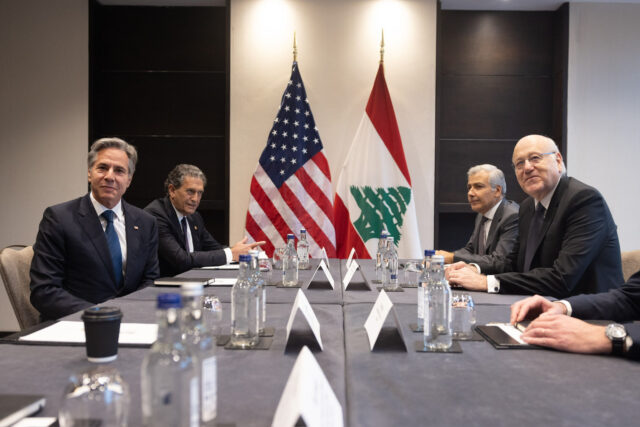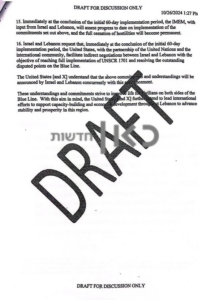
This came to us from someone monitoring the Israel-Lebanon ceasefire talks – of which we remain skeptical, though not without hope. It should be noted that both flags are at the table – unlike the very bad “Maritime Border Arragement” which was negotiated separately: US-Israel; US-Lebanon.
We have to assume that the first two points relate to the Government of Lebanon, such as it is, and do not assume that Hezbollah has some fictional “right” to “self-defense.”
In sum and in theory, this protects Israel by, among other things, permitting Israeli military action and overflights, at least for a period of time. Making the US the monitor is much better than either the UN or France – two prior possibilities.
 A draft of the agreement has been published; here is what it includes:
A draft of the agreement has been published; here is what it includes:
- Full cessation of hostilities by both sides.
- Both sides maintain the right to self-defense.
- Only UNIFIL and the Lebanese army will deploy south of the Litani line.
- Lebanon will be responsible for stopping the rearmament of Hezbollah. They are tasked with stopping arms from coming in and Hezbollah from reestablishing infrastructure.
- During a 60 day period Israel will remain in Lebanon and during that time the removal of Hezbollah to above the Litani line will commence.
- Only if the sides are happy with the progress of the disarmament will the conflict end permanently. That means after 60 days, Israel gets to evaluate progress.
- If satisfied, Israel and Lebanon will proceed to talks on how to fully implement Resolution 1701 and resolve border disputes.
There is also an outline for a verification mechanism:
- A monitoring mechanism will be chaired by the United States. If there are violations, that mechanism will look into them within a reasonable timeframe.
- There will be consequences for violations including sanctions.
- Israel has the right to act militarily at recognized violations that are not addressed in certain areas.
- Israel has the right to recon overflights over Lebanon.
The following analysis from The Times of Israel’s senior analyst Haviv Rettig Gur (@havivrettiggur) appeared on X:
The draft proposal for an Israeli-Lebanese agreement is incredibly favorable to Israel. There are two reasons for that.
1. Israel has shown it has the will and the ability to exact massive costs from those who attack our cities and civilians. Lebanon would like to avoid that.
2. More interestingly, Lebanon is grateful. Yes, really. Israel was extremely careful to target Hezbollah alone. Damage to other Lebanese factions, areas or institutions has been minuscule. With every IDF advance, the Lebanese army simply left the area. The Lebanese military knew this wasn’t a war against Lebanon but only against Hezbollah. It behaved accordingly. On the political front, Hezbollah’s weakening has brought calls for reform, including calls to weaken Iranian influence, from almost every part of the political spectrum, including even some Shia politicians. Long-time Hezbollah allies like the Druze leader Walid Jumblatt is a case in point. Ditto Michel Aoun and others. None of them love Israel. All are grateful for Hezbollah’s weakening.
In other words, the proposed deal is favorable to Israel — because Lebanon wants it to be. No other regional power has the will or capability to prevent a resurgence of Iranian influence in the country, and with it a return to the slow self-immolation that Hezbollah had imposed on Lebanon.
I’ve had some hard questions about Israeli strategy in Gaza going forward. Not so in Lebanon. The strategy in Lebanon has been clear-eyed, focused and effective.

